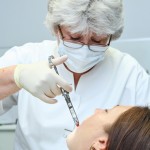
Articaine is a common local anaesthetic agent that shows greater lipid solubility than lidocaine, allowing enhanced diffusion through nerve sheaths. It also has an increased potency compared with lidocaine. The aim of this study was to compare the anaesthetic efficacy of 4% articaine with epinephrine (1:100,000) and without epinephrine in inferior alveolar nerve block anaesthesia for extractions of mandibular teeth.
Eighty-eight patients in need of a single tooth extractions were randomised to receive intraoral inferior alveolar nerve blocks using 4% articaine with 1:100,000 epinephrine (n = 41) or without epinephrine (n = 47) for extractions of mandibular teeth.
The main objectives were to compare the differences in onset as well as in length of soft tissue anaesthesia. Secondary objectives were to compare the amount of anaesthetic solution, need of a second injection, pain while injecting, pain during treatment, postoperative pain, and possible complications were surveyed.
They found that
- Anaesthesia was sufficient for dental extractions in both groups.
- Those receiving 4% articaine with 1:100,000 epinephrine, had a significantly faster onset of the anaesthetic effect (7.2 min vs. 9.2 min; P = .001) and a significantly longer duration of soft tissue anaesthesia (3.8 h vs. 2.5 h; P < .0001) .
- There was no significant difference in the amount of anaesthetic solution needed, in the need for a second injection, in the injection pain, in pain during treatment, or in postoperative analgesia. In both groups, no complications were seen.
The authors concluded
To minimize the epinephrine-induced side effects, 4% articaine without epinephrine is a suitable anaesthetic agent for dental extractions in the mandible after inferior alveolar nerve block anaesthesia. There could be less postoperative discomfort due to the shorter duration of anaesthesia without increased postoperative pain.
Kämmerer PW, Palarie V, Daubländer M, Bicer C, Shabazfar N, Brüllmann D, Al-Nawas B. Comparison of 4% articaine with epinephrine (1:100,000) and without epinephrine in inferior alveolar block for tooth extraction: double-blind randomized clinical trial of anesthetic efficacy. Oral Surg Oral Med Oral Pathol Oral Radiol Endod. 2011 Aug 6. [Epub ahead of print] PubMed PMID: 21821443.

Where can I purcase articaine without epi in the United States?
Hi Pauline
Not being based in the States I can’t offer any suggestions – other than you usual dental supplier – Perhaps some of the Elf’s followers can offer a suggestion?
can articaine without epinephrine be ordered from your supplier from someone who lives in the US?
can articaine without epinephrine be ordered from your supplier (outside the US) by a person who lives in the US?
I’m curious if during pinhole procedure on about 8 teeth if this 4% Attica be without epi would be advised? I can not tolerate epi and my dentist offered an agent that has epi although he believed it did not
In past I used carbocaine but mid procedure he said he needed to use epi bc of the bleeding
Regarding a fractured tooth that must be removed, I’m in pursuit of an alternative numbing agent/pain relievers– versus any dental pain relievers “regularly used” by oral surgeons or dentists.
That is, I’m looking for a pain reliever a doctor can use “other than” products ending in the word “caine”, and the reason is as follows ( My doctors don’t have an answer.).
Whenever a dental product ending with the word “caine” is used on me for a procedure, with or without epinephrine, I get extreme high BP. (Over 200s/100s).
I was told this is rare, but excessive high BP occurs within seconds after application (Adocaine, Lidicaine. and others. ). I do have hypotension. Is there an answer regarding an alternative numbing agent?
Strangely, a couple of years ago, three doctors, and EMT, and Pharmacist told me not to take more than the one initial, 1st dose of COVID-19 vaccine because of a my reaction: After I was injected, within seconds, extreme high BP and EMT (emergency) was called . Took me up to 4 months to fully recover from my side effect.
Makes me wonder if perhaps the covid vaccine and dental numbing agents have a same type of ingredient in it?